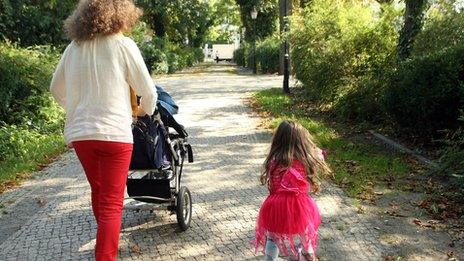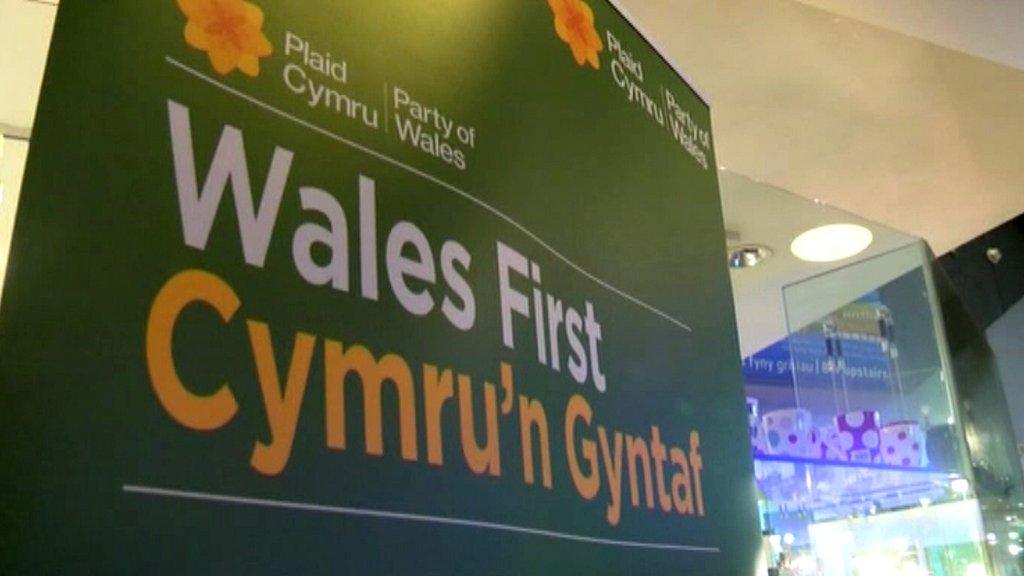Plaid Cymru leader Leanne Wood's call to reject 'Europhobia'
- Published
Leanne Wood said pro-Europeans had to make 'our voices heard and our voices count'
Plaid Cymru leader Leanne Wood has urged voters to reject "damaging Europhobia" led by UKIP in May's European election.
Ms Wood has told Plaid's spring conference in Cardiff that only her party can "further the Welsh national interest at the heart of Europe".
She appealed to ex-Liberal Democrat and Green voters not to stay at home, warning key issues could be sidelined.
Plaid was a "socially progressive voice over the din of despair", she said.
In a direct appeal to "despondent" former Lib Dem and Green Party supporters, the Plaid Cymru leader argued that a vote for Plaid was the way to keep issues such as climate change, international cooperation and tax avoidance on the European agenda.
Ms Wood warned the poll on 22 May could be the "last ever European election" if "we do not make our voices heard and our voices count".
"Do not forget what is at stake at this election. Do not forget all that will be put at risk if dangerous right-wing isolationist Europhobia is victorious.
"Our businesses rely on £5bn worth of trade with our EU partners every year. Our country has benefited from investment in our infrastructure and communities, with more on the horizon.
"More than one in 10 jobs are directly dependent on our membership of the EU - that's 150,000 reasons to vote Plaid Cymru in this May's election."
'No place'
The strong attack on a party that was until relatively recently regarded as a minor political player shows how seriously Plaid, and other parties, are taking the UKIP threat.
Plaid Cymru currently has one MEP, Jill Evans, who is due to address the conference on Saturday.
Ms Wood said: "Sowing the seeds of division, in our country and in this continent has no place.
"And I say to UKIP today, your politics have no place in our country, not now, not ever.
"Your values are not the values of Wales. A vote for UKIP is a vote against Wales - a vote against the Welsh national interest. We cannot and will not let their ugly politics divide us in May."
But Nathan Gill, UKIP's Welsh lead candidate for the European elections, said he had been called by dozens of our supporters and members who were angered by Ms Wood's claim that to vote UKIP somehow meant people were against Wales.
"It is apparent that Plaid Cymru is afraid of losing their coveted MEP for Wales, as a recent opinion polling shows that UKIP are consistently out-polling Plaid Cymru for this May's Euro elections," he said..
"However, for the party to descend to gutter politics and mud slinging is bigoted and outrageous," Mr Gill said.
Under a conference banner entitled "Wales First", Ms Wood said the Welsh Labour government lacked the ambition needed to expand the economy in Wales, accusing ministers of "giving up on driving up GDP (Gross Domestic Product)".
She revealed the party was consulting on proposals to create a new body, "outside the Welsh government", to make better use of European funding, other public funds and money from the private sector "for the maximum long-term economic benefit".
The Plaid leader also said the Scottish independence referendum offered an opportunity for Wales to achieve a fairer constitutional settlement.
She described the UK as an "unbalanced state - socially, politically and economically" and that "the opportunity must be taken" to "rebalance" it after the Scots vote in September.
Ms Wood called for a new Council of Ministers made up of all the UK nations to reach agreement on matters that were not devolved.
'Gather dust'
Earlier, during a discussion on the Silk Commission's report on assembly powers, Plaid's representative on the commission said he did not expect the UK government to respond to the findings until after September's referendum on Scottish independence.
Eurfyl ap Gwilym said he hoped all political parties would address the Silk proposals in their manifestos for next year's general election, so they could be implemented by MPs after the poll.
The report's recommendations included the devolution of youth justice and the police, large-scale energy projects and called for an increase in the number of assembly members increased.
However, when the conference was asked for a show of hands from those who believed the report would be implemented, rather than "gather dust", no one put up their hand.
- Published6 March 2014

- Published25 February 2014

- Published11 February 2014
